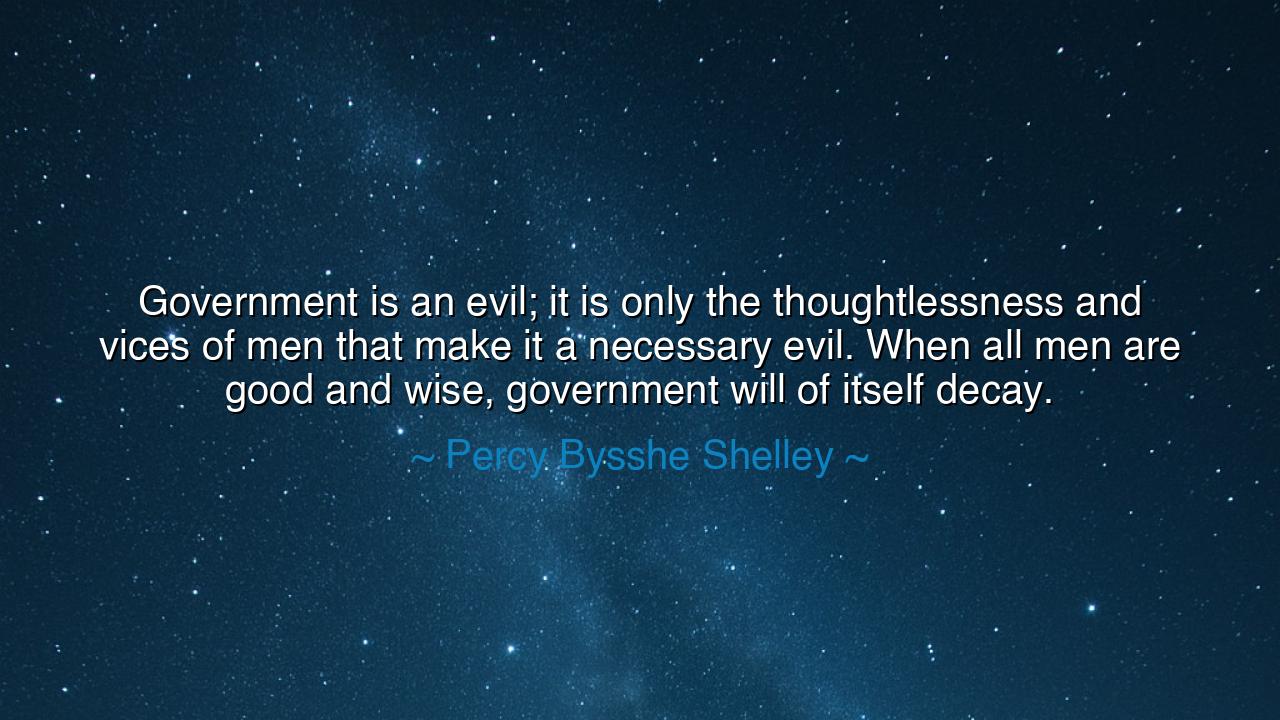
Government is an evil; it is only the thoughtlessness and vices
Government is an evil; it is only the thoughtlessness and vices of men that make it a necessary evil. When all men are good and wise, government will of itself decay.






When Percy Bysshe Shelley wrote, “Government is an evil; it is only the thoughtlessness and vices of men that make it a necessary evil. When all men are good and wise, government will of itself decay,” he spoke not as a cynic but as a visionary. Shelley, one of the great poets of the Romantic Age, was not condemning law itself, but rather the flawed nature of humankind that makes law indispensable. His words emerge from a deep faith in the potential of humanity — the belief that the truest form of freedom lies not in domination, but in self-governance guided by conscience and reason. In this vision, government is not the glory of civilization, but its crutch — necessary only because men have yet to learn to walk upright in virtue.
The origin of this thought can be traced to Shelley’s radical political philosophy during the early 19th century, a time of revolutions and reform. Living in the shadow of the French Revolution and the tyrannies that followed it, Shelley saw both the promise and peril of human government. He had witnessed how revolutions born in liberty could decay into despotism when the hearts of men were corrupted by greed and fear. Thus, he concluded that the true source of tyranny lies not in institutions, but in the moral condition of humanity itself. A corrupt people cannot create a just government, and a virtuous people has no need of one. His insight is timeless — for power, even when born from noble intent, becomes an evil when it feeds upon human weakness.
In calling government a “necessary evil,” Shelley joined a long tradition of philosophers who viewed the state as a remedy for human vice rather than a reflection of human perfection. His idea echoes the voice of Thomas Paine, who in Common Sense wrote that government, even in its best form, is “a necessary evil.” But Shelley goes further. He envisions a world where mankind, purified by wisdom and compassion, transcends the need for rulers altogether. He believed that when men learn to govern themselves — guided by justice, love, and understanding — the external machinery of authority would “of itself decay,” like scaffolding falling away once a temple stands complete.
Yet Shelley’s idealism is not naïve. He understood the weight of history — that power grows where virtue fails, and laws are forged only because conscience falters. Consider the story of the Athenian democracy, the first great experiment in self-rule. At its height, Athens was a beacon of art, philosophy, and freedom. Yet even there, the selfishness of factions and the corruption of demagogues brought ruin. The city that had once crowned Socrates as its wisest son condemned him to death for speaking truth. The government that was meant to protect wisdom became an instrument of folly. Shelley would have seen in this tragedy the proof of his belief: when men lack wisdom, government must become their guardian — but the guardian soon becomes their jailer.
Shelley’s quote also carries a profound moral challenge. He does not invite rebellion against government through violence, but reformation through virtue. If government is an evil born of vice, then the cure is not to destroy it, but to elevate the human spirit until it withers away naturally. He asks each man to become his own ruler — to master his impulses, to think before he judges, to act before he demands. For only when individuals are governed by their own conscience can society be free from the rule of force. In this sense, Shelley’s dream is not political but spiritual: a world redeemed from the need for control because men have learned the art of self-command.
We can see faint reflections of Shelley’s ideal in the lives of those who lived by inner law rather than external compulsion. Mahatma Gandhi, for instance, built his movement upon self-discipline, truth, and moral restraint — seeking to prove that a people bound by conscience could resist tyranny without violence. His vision of Swaraj, or “self-rule,” was more than independence from foreign power; it was freedom of the soul from anger, greed, and fear. Like Shelley, Gandhi believed that the truest liberty is born within, and that a righteous people need no master but their own virtue.
The lesson Shelley imparts is both humbling and exalted: do not curse government while nourishing the vices that sustain it. Every act of greed, deceit, or indifference strengthens the chains of control, while every act of wisdom and goodness weakens them. The decay of government that Shelley foretells will not come by rebellion or decree, but by the slow triumph of moral evolution. When men cease to exploit one another, laws will lose their teeth; when they cease to fear one another, armies will lose their purpose.
Therefore, let his words be taken as a call to moral awakening. Govern yourself with such integrity that no man need govern you. Be just without law, compassionate without command, and honorable without fear of punishment. For in the end, as Shelley foresaw, the destiny of mankind is not to be ruled — but to rise beyond the need for rulers, when every heart becomes its own kingdom of light and every soul, its own law.






AAdministratorAdministrator
Welcome, honored guests. Please leave a comment, we will respond soon